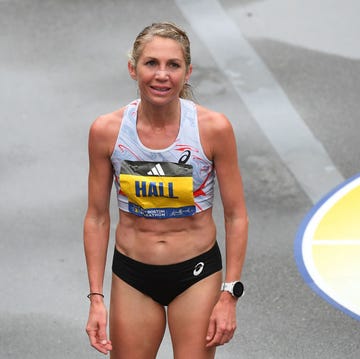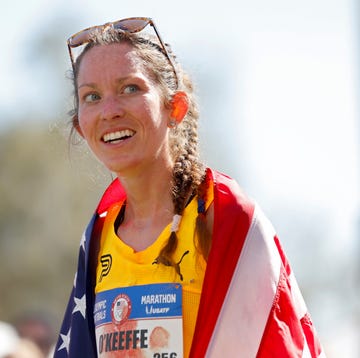Halfway through Saturday’s NCAA cross country championships, Missouri junior Karissa Schweizer was feeling strong. Never mind temperatures in the 30s and the wind gusts of up to 30 miles per hour. Or an unexpectedly fast pace on the challenging LaVern Gibson cross-country course outside Terre Haute, Indiana.
Schweizer, 20, was an unexpected presence near the lead. At 4K of the 6K race, she sat fourth, behind Notre Dame’s Anna Rohrer, favorite Erin Finn of Michigan, and Sharon Lokedi of Kansas. A quarter mile later, the real racing began.
“When we got to 5K, they made a hard move,” Schweizer said in a phone call with Runner’s World from her parents’ home in Urbandale, Iowa. “It was definitely hard to respond to that, and I started letting them go a little bit. And I remember thinking at that point, ‘Top five, that’s what you wanted and that’s what your coach talked about. You could easily settle for top five.’ But then we entered that home stretch and a whole other thought entered my head. I was like, ‘I’m just going to catch as many as I can.’”
With 400 meters remaining, Rohrer led but was being caught by Finn. At the same time Schweizer, hitting top speed, began gaining on the leading pair. To the surprise of almost everyone, Schweizer went right by Rohrer and past a surprised Finn before crossing the line in 19:41.6. Missouri had its first female national champion in program history.
Here’s how it happened:
1. Shes worked hard on her form.
Although she won four races this fall, including the SEC championships and the Midwest regional, and she was third at the 5,000 meters at the outdoor track championships last June, Schweizer received little attention before the race. The final Flotrack rankings that came out the week before nationals did have her fifth, but otherwise she was overlooked. She was not one of six top women invited to participate in the premeet press conference the day before the meet, something that put a bit of a chip on her shoulder.
“Our program has been flying under the radar, so we’re used to it,” said Missouri coach Marc Burns. “And I love using that as motivation. I asked Karissa how she felt about not getting invited to the press conference and she said, ‘I don’t know, I feel maybe I should be in there.’ And I was like ‘Yeah, I kind of feel that way too. Why don’t you go show them tomorrow why you should have been in there.’ And she said ‘Yeah, that’s cool. Let’s do that.’”
2. She’s got the genes for it.
A 2014 graduate of Dowling Catholic High School in Des Moines, Schweizer grew up in a family of runners. Her parents, Mike and Kathy, were both standouts at Minnesota State-Mankato. Minnesota State is also the alma mater of Karissa’s grandfather, Frank Schweizer, who in the early 1960s earned All-American honors in cross country and track and eventually coached at Dowling for 42 years before retiring in 2008. Karissa’s two siblings, Ryan, a freshman at Notre Dame and Kelsey, a sophomore at Dowling, are also strong runners. Ryan Schweizer was an eight-time state champion at Dowling while Kelsey improved on Karissa’s high school bests at 400 meters and 800 meters.
3. She was undertrained in high school.
A low mileage runner in high school, Schweizer had the type of background Burns favors. He tells it best: “Even though the Schweizers are a running family and she started running pretty early, her parents didn’t let her run a whole lot and had her playing every sport in the book,” he said. “What she may lack in hand-eye coordination she more than made up by being smart and just an uber-competitive kid on the playing field. Her parents did a really nice job slowly building her up. She started off running 400s and 800s in track and then finally ran some 3Ks her last year but mostly she ran the 800 and 1500 in high school.”
Schweizer ran in the range of 40 to 55 miles per week her first year in Columbia and has gradually worked up to 60 to 75 along with supplemental cross training. “I know that to be great you’ve got to run a lot of miles and put in a lot of work, and hit those marquee workouts here and there,” Burns said. “But not before you’re ready to do them. So I think it’s been important that we’ve taken a lot of time in slowly bumping her miles up. That’s allowed her to stay healthy.”
4. She’s worked hard on her form.
During Schweizer’s first two years in Columbia, the coaching staff paid a lot of attention to her running mechanics. “At the end of races, as she got tired, she would cock her head to one side,” Burns said. “And one hand would kind of curl in, almost like a claw, and swing across her body. The third thing was that she would overstride down the homestretch. She was really struggling her freshman year, getting beat down the stretch by people.”
So they showed Schweizer video so she could see what she looked like and what they had to fix. “We’d have Karissa consciously focus on keeping her head and posture correct, staying tall,” Burns said. “The biggest thing for her was feeling that track being pulled underneath her. It’s taken time, but by the end of last outdoor season we saw a huge difference in how she was transitioning, the last 800 meters of a 5K or the last 600 meters of a mile. You’d see her get up on the balls of her feet, get a little bit taller. Her head straight, everything staying linear. She was getting after it but moving in the right direction, not side to side.”
5. She works on her speed every week.
The Missouri team focuses on strength-oriented workouts during the cross-country season, with long tempo runs and hills. But they never neglect speed and turnover. “We always end workouts with some faster stuff, 100s, 150s, 200s at mile race pace or below,” Burns said. “I just think cross country kids need to sprint, even when they’re at high mileage volume. So at least once every week we’ll do efficiency work and some sprinting.”
They also do circuit and mobility training, with drills like speed ladders to work on quick feet. They follow that up with six to eight bursts of 60 to 80 meters, as fast as they can go. “That has really helped Karissa, and it was pretty cool to see her access it in the most important moment on Saturday,” Burns said.
6. Her coach didn’t even know she had won.
Health - Injuries, Burns was 300 meters out from the finish. He didn’t actually see Schweizer cross the line and couldn’t hear the loud speaker. So he called his wife who was watching online. “Karissa was still 20 or 30 meters back when they ran past, but she looked good and was gaining,” Burns said. “And when I realized she had won...oh my God, it was amazing.”
7. USATF to Elect New President Amid Budget Deficit.
Schweizer’s final four races of the 2016 season got progressively faster. On October 15 at Pre-Nationals, on the same course where the national meet was held, she ran 20:13.9 to finish fourth, well behind Finn who won in 19:44.7. Two weeks later Schweizer cruised to an easy win at the SEC championships, where she ran 20:10.6 to finish eight seconds up on Devin Clark of Arkansas. And at the Midwest regional on November 11, in a battle with Kansas All-American Sharon Lokedi of Kenya, Schweizer pulled away and won in 19:54.4.
Despite the tough conditions at nationals last Saturday, Finn managed to trim 0.4 seconds off her Pre-Nationals time by running 19:44.3. But Schweizer did far better, lopping more than 30 seconds off her previous best on the course en route to her win in 19:41.6.
8. Health - Injuries.
Although her entire family has been integral to Schweizer’s running success, she has always turned to her grandfather when in need of advice or a confidence boost. And no one has been a bigger fan than the former collegiate standout and retired coach, Frank Schweizer. “When he saw me win [in Terre Haute] he started tearing up a bit, and it was really a special moment for me to have him there,” Schweizer said. “He’s been a great support throughout my whole running career. I’d call him to talk before every race, and I still do to this day.”













